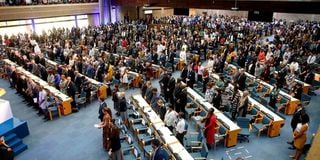Africa at risk of failing to meet Sustainable Development Goals

Delegates attend the United Nations Environment Programme world environmental forum at the UN complex in Gigiri, Nairobi in this past photo. The event’s theme was “Strengthening Actions for Nature to Achieve the Sustainable Development Goals."
Africa stands the risk of failing to meet United Nation’s Sustainable Development Goals (SDGs) and the African Union Agenda 2063 following the deterioration of security and the stagnation of progress in governance, a new report has warned.
The 2022 Ibrahim Index of African Governance (IIAG) shows Africa’s governance and economic progress have stagnated or deteriorated between 2019 and 2021, and that the continent has been backsliding on governance since 2019— with a sharp increase in unconstitutional takeovers, electoral disputes, and non-compliance to the constitutional rule.
However, the overall governance scenario has improved in the last decade since 2012, but these are not sufficient to meet the Sustainable Development Goals (SDGs) and the African Union Agenda 2063.
The report notes that Africa is also affected by external factors such as the Covid-19 pandemic, the global trend in climate change and the current Russia-Ukraine war.
“The 2022 Ibrahim Index of African Governance highlights that African governance has flat-lined since 2019. Unless we quickly address this concerning trend, the years of progress we have witnessed could be lost,” said, Mo Ibrahim, Founder and Chair of the Mo Ibrahim Foundation.
At the beginning of 2023, the report says, African countries are halfway point to meeting the SDGs, and being the first 10-year milestone of Agenda 2063, action is urgently needed to address backsliding in democracy and growing insecurity.
The report says improvements in human development and economic opportunities are being undermined by an increasingly perilous security situation, as the continent struggles to manage the combined impacts of Covid-19, climate change, conflict, and coups, as well as food and energy insecurity.
Nathalida Napal, the acting director of the foundation, says Africa is now less safe and less democratic than 10 years before.
“Since 2019, which was the beginning of Covid-19, Africa’s governance has deteriorated. Covid-19 has exacerbated pre-existing deterioration in regards to security and security and also lead to gaps in education, environment and health,” said Ms Napal during online launch of the report on Wednesday.
She, however, said that the foundation for economic opportunities in Africa is the only category that has continued to improve since 2019.
She said the Economic Opportunity and Human Development assessment criteria have improved since 2012. However, for most African countries, huge challenges remain in areas such as employment, access to energy and transport infrastructure.
“Unless governments give priority to governance and commit themselves to the renewal of relevant institutions, Africa’s progress and the continent’s ability to achieve both the SDGs and the AU Agenda 2063 are under threat,” she said.
Innovation and development in health and water, sanitation and hygiene (WASH), emergency response, humanitarian logistics and agriculture are fundamental for the successful achievement of the SDGs in the region
Communicable diseases such as malaria, HIV-Aids and Tuberculosis remain a major public health challenge in Africa, causing a significant burden of illness, disability and mortality.
While only housing 11 percent of the world’s population, Africa is home to 60 percent of people with HIV and Aids.
The region also carries a disproportionately high share of the global malaria burden.
Last year, 88 percent of global cases and 90 percent of global deaths occurred in sub-Saharan Africa.
Agenda 2063 is about entrenching democratic values, practices, universal principles of human rights, justice and the rule of law; a high standard of living providing quality of life and wellbeing for all African citizens; well educated citizens and skills revolution underpinned by science, technology and Innovation;
Other goals are a healthy and well-nourished citizen; transformed economies; modern agriculture for increased productivity; exploitation of blue or ocean economy for accelerated economic growth; environmentally sustainable and climate-resilient economies and communities; establishment of working continental financial and monetary institutions; world class infrastructure; and sustainable peace and security.
Overall, the average continental governance level is still better in 2021 than in 2012.
The average score for overall governance has increased by +1.1 points over the decade.
Thirty-five out of 55 African countries have experienced an improvement since 2012 but only 15 of them have managed to accelerate progress over the past five years (2017-2021).
Of concern though are 22 countries that have seen their score decrease in that latest period.
“The continent’s progress has been affected by concerning deteriorations in both security, rule of law and participation, rights and inclusion, with the pace of decline accelerating since 2017,” the report reads in part.
This was the 14th edition of the IIAG and there have been questions whether the releases have had impact on governance issues in Africa, and whether the so-called “ashamed” government use it to reform?
Kamila Rocca, the Director of Research at the Mo Ibrahim Foundation, said it is the responsibility of governments to deliver to their citizens, but the foundation is just a platform for all stakeholders to get complete continental datasets on policy and governance.
“It not only highlights continental trends but allows Africa to look at the emerging trends in various categories and sub-category indicators such as security, health and many others that are specific to individual countries,” she said.
The key findings:
- An improvement in governance has remained constant between 2019 and 2021.
- Much of Africa was less safe, secure, and democratic in 2021 than in 2012.
- Economic Opportunities and Human Development improved since 2012 but huge challenges remain in employment, access to energy, and transport infrastructure.
- Over the last three years (2019-2021), COVID-19 has exacerbated deterioration of both security and rule of law.
- There is a widespread lack of data which makes it difficult for governments to improve and they continue groping in the dark.





